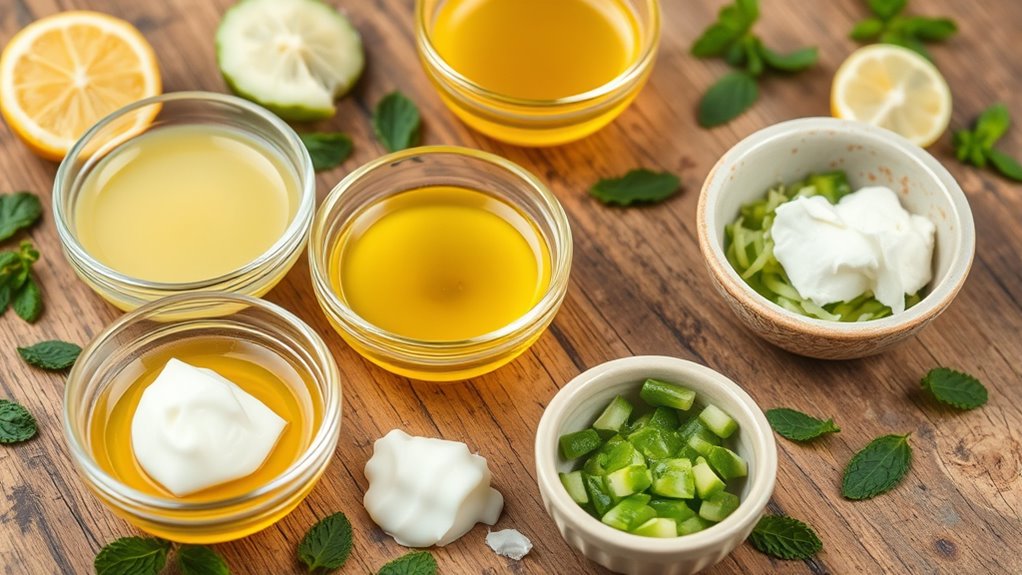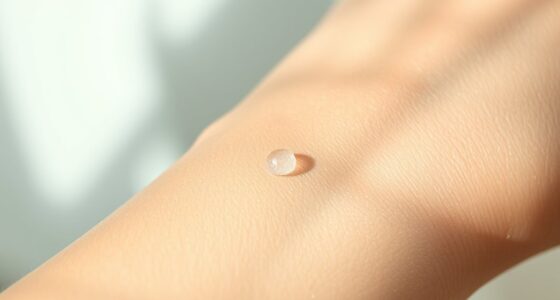You can create simple, effective DIY face masks with everyday kitchen ingredients like honey, yogurt, oats, citrus fruits, and bananas. Choose based on your skin needs—honey for acne, yogurt for exfoliation, oats to soothe, citrus for brightness, or bananas for hydration. Mix and match these natural items for personalized treatments that nourish and refresh your skin. To discover easy recipes and tips, keep exploring ways to make the most of these wholesome ingredients.
Key Takeaways
- Combine natural ingredients like honey, yogurt, oats, citrus, and bananas to create customizable face masks for various skin needs.
- Use gentle exfoliants such as oats and lactic acid from yogurt to remove dead skin and reveal a radiant complexion.
- Incorporate hydrating ingredients like bananas and honey to nourish and soften dry or sensitive skin.
- Dilute citrus juices before applying to avoid irritation, especially for sensitive skin types.
- Always perform patch tests and tailor mask ingredients for specific skin concerns to ensure safe and effective results.

Have you ever wondered how to create effective face masks at home? It’s simpler than you might think, especially when you tap into your kitchen for natural ingredients. Using common items like honey, yogurt, or oats, you can craft masks that deliver real skin benefits without the need for harsh chemicals. These natural ingredients are gentle yet potent, making them suitable for all skin types, even sensitive skin. Plus, they’re affordable and easy to customize based on your skin’s needs.
Honey is a popular choice because of its natural antibacterial properties. It helps soothe irritated skin, reduce redness, and fight acne-causing bacteria. When applied as a mask, honey penetrates deep into pores, moisturizing while cleansing. Its natural antioxidants also promote a brighter complexion over time. Yogurt, another versatile ingredient, contains lactic acid that gently exfoliates dead skin cells, revealing a smoother, more radiant surface. It’s especially beneficial for dull or uneven skin tones, providing a gentle, natural glow.
Oats are excellent for calming inflammation and soothing sensitive skin. When ground into a fine powder, oats become a gentle exfoliant that removes dirt and excess oil without stripping your skin’s natural moisture. Combined with honey or yogurt, oats can create a nourishing mask that reduces redness and irritation while improving skin texture. These ingredients aren’t just effective—they’re packed with nutrients that your skin recognizes and appreciates, making them a safe and natural way to maintain a healthy complexion.
Additionally, contrast ratios in natural ingredients can influence how well your skin responds to different treatments, ensuring visible improvements. These ingredients aren’t just effective—they’re packed with nutrients that your skin recognizes and appreciates, making them a safe and natural way to maintain a healthy complexion.
Citrus fruits like lemon or orange juice can add a boost of vitamin C, helping brighten dull skin and even out skin tone. Just be cautious with acidity if you have sensitive skin, and always dilute the juice. Bananas are another natural ingredient, rich in vitamins and minerals, which hydrate and soften the skin. When mashed and mixed with other ingredients like honey or yogurt, bananas provide a nourishing, moisturizing mask that can help improve elasticity and prevent dryness.
The beauty of DIY face masks using kitchen ingredients is that you can tailor them to your specific needs. Whether you want to hydrate, exfoliate, or clarify your skin, there’s a natural ingredient that can help. Always remember to patch-test new masks to ensure your skin reacts well. With a little creativity and knowledge of your skin’s needs, you can enjoy the skin benefits of these natural, kitchen-made treatments anytime. These simple, effective masks are a testament to how powerful natural ingredients can be for your skincare routine.
Frequently Asked Questions
Can I Use Expired Kitchen Ingredients for Face Masks?
You might wonder if expired ingredients are safe for face masks. While some expired kitchen items may still be fine, safety concerns arise because their effectiveness can diminish, or they might harbor bacteria. Always check for signs of spoilage like foul odors or mold. To avoid risks, it’s best to use fresh ingredients or consult reliable sources. Remember, your skin’s health is worth prioritizing over cost savings from expired items.
How Often Should I Apply a DIY Face Mask?
Think of your skin as a delicate garden needing careful tending. You should follow the frequency guidelines for DIY face masks—usually 1-3 times a week—to avoid overwhelming your skin. Monitor your skin’s reaction closely; if you notice redness or irritation, give it a break. Consistency and attentiveness are key to nurturing your skin’s health, ensuring your natural beauty blossoms without damage.
Are There Any Skin Types That Should Avoid Certain Ingredients?
If you have skin sensitivities or ingredient allergies, you should be cautious when using homemade face masks. Certain ingredients like honey, citrus, or cinnamon can trigger reactions. Always do a patch test first to check for any adverse effects. If you notice redness, itching, or irritation, stop using the mask immediately. Knowing your skin type helps you avoid ingredients that could cause breakouts or irritation, keeping your skin safe and healthy.
Can Kitchen Ingredients Replace Professional Skincare Treatments?
You might wonder if kitchen ingredients can replace professional skincare treatments. While natural ingredient alternatives can be effective for minor skin issues, they shouldn’t replace professional advice for serious concerns. DIY skincare safety is essential; some ingredients can cause irritation or allergic reactions. Use caution, research thoroughly, and consult a dermatologist if needed. Remember, professional treatments are tailored for specific skin needs and often deliver better, safer results.
Are Homemade Face Masks Safe for Sensitive Skin?
Imagine your skin as a delicate garden needing gentle care. Homemade face masks can be safe for sensitive skin concerns if you choose natural ingredients carefully. You need to be cautious, as some kitchen items might cause irritation. Always test a small patch first and prioritize natural ingredient safety. When used thoughtfully, DIY masks can nurture your skin without overwhelming its sensitivity, like tending to fragile blooms with gentle hands.
Conclusion
Now that you know how easy and affordable it is to create your own face masks with kitchen ingredients, you’re empowered to treat your skin naturally. Think of these masks as a nourishing hug for your face—simple, comforting, and effective. Just like a homemade meal, they remind us that sometimes, the best care comes from what we already have at home. Give it a try, and watch your skin glow with confidence and care.









